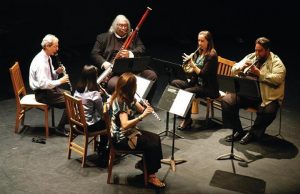
The classical music world has adapted rapidly and skillfully to the coronavirus pandemic when it comes to the presentation of concerts.
Look no further than YouTube or the Facebook page of your favorite presenting institution and you’re likely to find streams of live music that in the absence of audiences at least are keeping the faith alive.
And so it is that the Palm Beach Chamber Music Festival, a summer institution for local classical fans for nearly 30 years, has joined the Zoom generation and is prepared to offer its season this month in digital fashion. This time there will be three concerts instead of four – and all of them will be on tape, having been performed in an otherwise empty room.
Deft as this recovery is for the festival, the pandemic has dealt a serious blow to the local classical community, whose freelance musicians have lost most, if not all, of the jobs they had counted on.
“It’s been a real shock to the system,” festival co-founder Karen Fuller said.
The festival’s three founders – flutist Fuller, clarinetist Michael Forte and bassoonist Michael Ellert – decided that while the concerts could not go in the summer as planned because of the virus, which has now claimed almost 135,000 people nationwide. But they didn’t want the season to go entirely silent, either.
“We thought full-length concerts would be too long,” Forte said, given that live concerts in the series usually run 90 minutes to 2 hours, a substantial length for video viewing on computer devices. So the events have been scaled back to about half an hour of music, with shorter self-contained works and excerpts from larger pieces.
Beginning at the end of June and extending over a two-week period, the musicians of the festival put together three half-hour programs at the Crest Theatre in Delray Beach’s Old School Square. The concerts will debut each Friday night for the last three weeks of July beginning on the 17th.
Each concert will be broadcast at 7:30 p.m. on the Old School Square site and will be available for a month. Tickets are $10 for each concert, or a three-concert subscription for $25. As of Sunday, the Old School Square page for the concerts was not yet operative, but when it is, there also will be links on the festival’s home page, Fuller said.
The 29th season looks like this:
The July 17 program features the American composer Robert Mucyzinski’s Fragments, a trio for flute, clarinet and bassoon, played by the three founders. The slow movement of the Dvorak Piano Trio No. 3 (in F minor, Op. 65), with violinist Dina Kostic, cellist Susan Bergeron and pianist Lisa Leonard, comes next, and the concert ends with a suite (Op. 157b) for violin, clarinet and piano by the Les Six modernist Darius Milhaud. Kostic and Forte will be accompanied by pianist Joseph Kingma.
The second program (July 24) opens with two movements (the opening and a slow movement called “The Shepherd’s Lament”) from a rarely heard but delightful trio for flute, cello and piano by the early Romantic German composer Carl Maria von Weber; Fuller, Bergeron and Kingma are the performers. Bergeron, Kostic and Leonard offer one movement of the American composer Paul Schoenfeld’s popular Café Music, with violinist Mei Mei Luo joining Leonard afterward for the well-known “Méditation” from Jules Massenet’s 1896 opera Thaïs. The second concert ends with two movements from another relative rarity, the Trio Pathétique for clarinet, bassoon and piano by the Russian composer Mikhail Glinka, who later would write the first important Russian opera (A Life for the Tsar).
The last concert (July 31) opens with the first movement of Beethoven’s Ghost Trio (in D, Op. 70, No.1 ), with Kostic, Bergeron and Leonard. Camille Saint-Saëns’ Tarantella for flute, clarinet and piano comes next, with Fuller, Forte and Kingma. Norwegian composer Johan Halverson’s showstopping arrangement of a Handel passacaglia for violin and cello is performed by Luo and Bergeron, and the concert ends with the opening movement of the Piano Trio No. 2 (in C, Op. 87) of Johannes Brahms.
In addition to videography from the Old School Square staff, the festival had help from others including Bob Luptak of the Boca Steinway Gallery, who donated the use of a Steinway piano for the performances. An anonymous donor paid for the delivery of the piano to Old School Square, festival officials said.